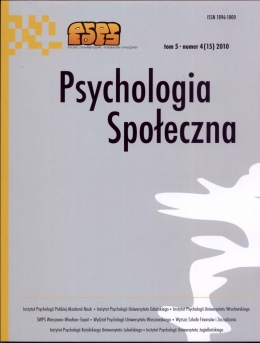Interpersonalne konsekwencje wybaczenia. Kiedy wybaczenie nie jest mile widziane?
Interpersonal consequences of forgiveness.When forgiveness is not welcome?
Author(s): Eufrozyna Gruszecka, Jarosław PiotrowskiSubject(s): Psychology
Published by: Wydawnictwo Naukowe Scholar Sp. z o.o.
Keywords: harm; forgiveness; retribution; helping; liking
Summary/Abstract: Participants were led to believe that they have made a mistake which has thwarted experimenter’s work. The experimenter has forgiven them, or he has not, and asked them or not for a favor. In the fi rst study, participants who experienced forgiveness only (“pure” forgiveness condition) liked the experimenter more than participants who experienced forgiveness along with the request for a favor. Similar pattern of results was revealed when participant evaluated the experimenter’s competence, intention to be in contact with him, and the study in general. The second study only partially replicated the described results. In this study, participants’ mood was also assessed. Under conditions of “pure” forgiveness, participant’s mood increased, and under conditions of “conditional” forgiveness it decreased. Results of both studies suggest that conditions of pure forgiveness and conditions of lack of forgiveness associated with the possibility to redress the wrongdoing are emotionally equivalent (equally positive) and different from the condition of lack of forgiveness associated with no chance to redress the wrongdoing.
Journal: Psychologia Społeczna
- Issue Year: V/2010
- Issue No: 15
- Page Range: 316-329
- Page Count: 13
- Language: Polish

